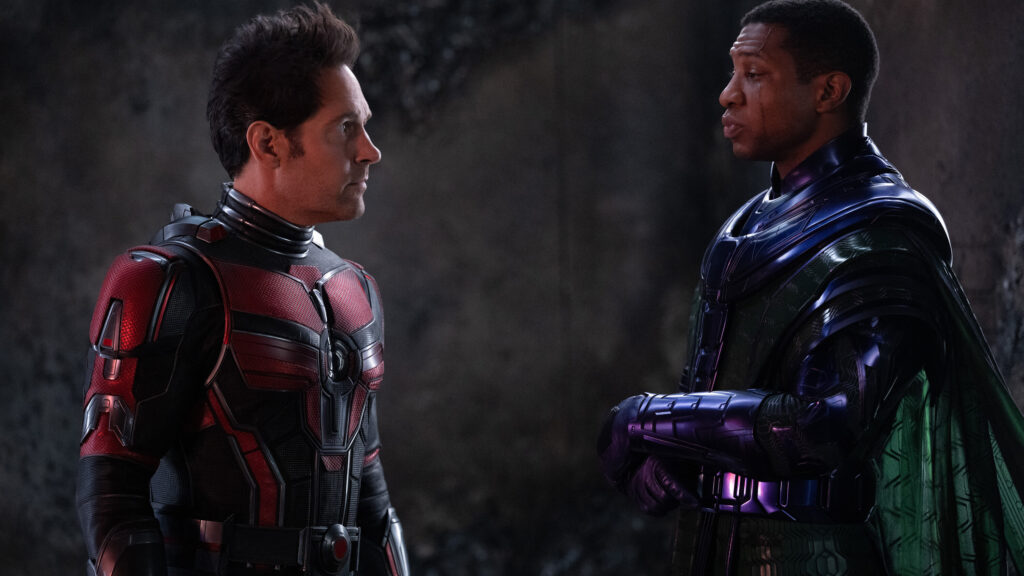Ant-Man and the Wasp: Quantumania is Marvel’s greatest embarrassment
Written by Ian Thomas Malone, Posted in Blog, Movie Reviews, Pop Culture
The criticism of Marvel movies possessing a paint-by-numbers feel has existed for almost as long as the MCU itself. The idea that each superhero’s journey serves as little more than an Instagram filter over the exact same formula isn’t entirely unfair, but the MCU has generally managed to make up for its lack of originality with an abundance of charm. Ant-Man and the Wasp: Quantumania is a depressing case study of what happens to the whole enterprise when the same song and dance starts to lose its muster.
Scott Lang (Paul Rudd) is one of the few surviving Avengers who actually seems to be enjoying life after the events of Endgame. Parlaying his fame into a successful memoir, Scott seems to have finally left his past behind, though his daughter Cassie (Kathryn Newton, the third actress to portray the character) worries that he may have lost sight of the needs of the world around him. Whether Hope van Dyne (Evangeline Lilly), now successful CEO of the Pym Foundation, agrees is largely unclear, since most people involved with making the film seem to have forgotten that the Wasp shares equal billing with Ant-Man, generally implying a sense of lead-character status.
The film’s plot quickly is set in motion after Cassie and Hank Pym (Michael Douglas), who the former now refers to as “grandpa” with absolutely zero explanation, craft a device that can communicate with the Quantum Realm, where Janet van Dyne (Michelle Pfeiffer) was famously trapped for thirty years. The idea that Scott too was trapped there after the events of the last Ant-Man film or that the space served as the main catalyst driving the events of Endgame is not deemed relevant to the plot. Naturally, a portal to the QR is a terrible idea, and the five find themselves sucked into a vortex, split up into two very convenient groups. Scott and Cassie get some space to work on their father/daughter bond, while Hope and her parents wander around looking for something that might resemble an interesting storyline.
Director Peyton Reed never seems terribly interested in exploring his characters as people. Unfortunately, Quantumania can’t really explore the Quantum Realm either, not with the severely limited scope of its special effects department. Marvel’s laziest cinematography reduces the Quantum Realm to a monotonous green screen that looks to be about the size of an elementary school gymnasium, forcing all the actors to stand in place for almost the experience. Seasoned cinematographer William Pope recycles the same zoomed-in shot of the characters’ upper torsos again and again, presumably to clip coupons for the visual effects department. The color palette is bland and dreary, like a child cross-contaminated their Easter egg dyes, a tedious depressing eyesore.
The performances are almost as lifeless as the CGI. Rudd, Douglas, Lilly, and newcomer Bill Murray all looked bored out of their minds, the latter as if he required a sedative to get through his scenes. If Murray agreed to shoot more than one take for any of his scenes, it certainly doesn’t come across in the final product. The jokes fall flat, with Rudd constantly betraying his complete awareness of what a disaster he’s starring in. Pfeiffer and Newton try their best to make the most of their character’s expanded roles, though their attempts to convey awe and wonder for the Quantum Realm fall flat in the incoherent narrative that moves swiftly through its 124-minute runtime, quite short by MCU standards.
Quantumania suffers under some predictable hurdles that befall most third entries. The film already has too many characters within the Ant-Man family, on top of carrying the weight of a certain iconic villain in Marvel lore. Jonathan Majors makes his proper MCU debut as Kang the Conqueror after playing an alternate-timeline variant in Loki. Kang is supposed to be the MCU’s next Thanos-level threat, already announced as the villain of the next Avengers film set for release in 2025.
Majors is always a joy to watch, but Quantumania is simply not a good outlet for his talents. Kang’s introduction is quite rushed, a reality of the film’s scattershot interests. Majors brings some depth to the lifeless experience, but his performance often serves to highlight the film’s abundant limitations. The plot grows exceedingly incoherent in the film’s third act, a narrative completely out of steam by the time Kang gets to do anything interesting. The film would have been much better off allowing secondary villain M.O.D.O.K., another iconic figure in Marvel lore, to slot in as the main antagonist, sparing Majors for a narrative that could bring some dignity to Kang as a character. It’s unclear how Marvel expects anyone to want more of Kang after this clownish endeavor.
Quantumania represents an embarrassing low point for the MCU, a soulless cash-grab that debases the very idea of cinema itself. A just world would never allow the superhero genre to recover from such an artistically bankrupt abomination. This movie just doesn’t fail to give its audience a reason to care for its narrative, it makes you wonder why you ever cared in the first place.











